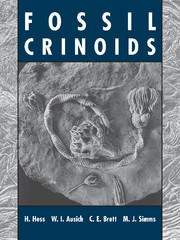Book contents
- Frontmatter
- Contents
- List of Contributors
- Acknowledgements
- Prelude
- Introduction
- GENERAL PART
- ASSEMBLAGES
- 6 Middle Ordovician Trenton Group of New York, USA
- 7 Middle Ordovician of the Lake Simcoe Area of Ontario, Canada
- 8 Upper Ordovician of the Cincinnati, Ohio, Area, USA
- 9 Silurian of Gotland, Sweden
- 10 Middle Silurian Rochester Shale of Western New York, USA, and Southern Ontario, Canada
- 11 Scyphocrinitids from the Silurian–Devonian Boundary of Morocco
- 12 Lower Devonian Manlius/Coeymans Formation of Central New York, USA
- 13 Lower Devonian Hunsrück Slate of Germany
- 14 Middle Devonian Windom Shale of Vincent, New York, USA
- 15 Middle Devonian Arkona Shale of Ontario, Canada, and Silica Shale of Ohio, USA
- 16 Lower Mississippian Hampton Formation at LeGrand, Iowa, USA
- 17 Lower Mississippian Burlington Limestone along the Mississippi River Valley in Iowa, Illinois, and Missouri, USA
- 18 Lower Mississippian Edwardsville Formation at Crawfordsville, Indiana, USA
- 19 Upper Pennsylvanian LaSalle Member, Bond Formation of Central Illinois, USA
- 20 Permian
- 21 Triassic Muschelkalk of Central Europe
- 22 Pentacrinites from the Lower Jurassic of the Dorset Coast of Southern England
- 23 Lower Jurassic Posidonia Shale of Southern Germany
- 24 Middle Jurassic of Southern England
- 25 Middle Jurassic of Northern Switzerland
- 26 Upper Jurassic Solnhofen Plattenkalk of Bavaria, Germany
- 27 Uintacrinus Beds of the Upper Cretaceous Niobrara Formation, Kansas, USA
- 28 Tertiary
- 29 Recent
- Appendix I Geological Time Table with Crinoid Assemblages
- Appendix II Glossary of Rocks
- Bibliography
- General Index
- Taxonomic Index
17 - Lower Mississippian Burlington Limestone along the Mississippi River Valley in Iowa, Illinois, and Missouri, USA
Published online by Cambridge University Press: 10 November 2010
- Frontmatter
- Contents
- List of Contributors
- Acknowledgements
- Prelude
- Introduction
- GENERAL PART
- ASSEMBLAGES
- 6 Middle Ordovician Trenton Group of New York, USA
- 7 Middle Ordovician of the Lake Simcoe Area of Ontario, Canada
- 8 Upper Ordovician of the Cincinnati, Ohio, Area, USA
- 9 Silurian of Gotland, Sweden
- 10 Middle Silurian Rochester Shale of Western New York, USA, and Southern Ontario, Canada
- 11 Scyphocrinitids from the Silurian–Devonian Boundary of Morocco
- 12 Lower Devonian Manlius/Coeymans Formation of Central New York, USA
- 13 Lower Devonian Hunsrück Slate of Germany
- 14 Middle Devonian Windom Shale of Vincent, New York, USA
- 15 Middle Devonian Arkona Shale of Ontario, Canada, and Silica Shale of Ohio, USA
- 16 Lower Mississippian Hampton Formation at LeGrand, Iowa, USA
- 17 Lower Mississippian Burlington Limestone along the Mississippi River Valley in Iowa, Illinois, and Missouri, USA
- 18 Lower Mississippian Edwardsville Formation at Crawfordsville, Indiana, USA
- 19 Upper Pennsylvanian LaSalle Member, Bond Formation of Central Illinois, USA
- 20 Permian
- 21 Triassic Muschelkalk of Central Europe
- 22 Pentacrinites from the Lower Jurassic of the Dorset Coast of Southern England
- 23 Lower Jurassic Posidonia Shale of Southern Germany
- 24 Middle Jurassic of Southern England
- 25 Middle Jurassic of Northern Switzerland
- 26 Upper Jurassic Solnhofen Plattenkalk of Bavaria, Germany
- 27 Uintacrinus Beds of the Upper Cretaceous Niobrara Formation, Kansas, USA
- 28 Tertiary
- 29 Recent
- Appendix I Geological Time Table with Crinoid Assemblages
- Appendix II Glossary of Rocks
- Bibliography
- General Index
- Taxonomic Index
Summary
CRINOIDS BY DOCTOR'S PRESCRIPTION
Charles Wachsmuth was an ill man. This German native immigrated to the United States to pursue a mercantile career and eventually settled in Burlington, Iowa, in an attempt to find a better climate. In his early 30s and with his health continuing to fail, his doctor prescribed fresh air and exercise. According to Keyes (1897, p. 13), the doctor suggested ‘that the collecting of fossils, which abounded in the rocks of the neighborhood, would soon provide an incentive for sufficient exercise’. Thus, this resident of Burlington began to collect fossils from country underlain by perhaps the largest accumulation of crinoidal remains anywhere in the world, the Lower Mississippian Burlington Limestone. The study of fossil crinoids became a consuming interest for Charles Wachsmuth for the next 30 years. With the encouragement of Alexander Agassiz (Harvard University), Wachsmuth's collecting zeal matured to scientific curiosity. Wachsmuth accumulated a fantastic collection of fossil crinoids, which was eventually sent to the Museum of Comparative Zoology. Soon thereafter, Wachsmuth began to develop a second collection, which became even better than the first. Most of Wachsmuth's scientific work was completed in collaboration with Frank Springer. Springer was a native Iowan who developed an interest in natural history and fossils at an early age. Springer began a law practice in Burlington, Iowa, and also began collaborative studies on crinoids with Wachsmuth. In 1873 Springer moved his practice to New Mexico and became established as one of the foremost lawyers in this developing area of the United States.
Information
- Type
- Chapter
- Information
- Fossil Crinoids , pp. 139 - 144Publisher: Cambridge University PressPrint publication year: 1999
Accessibility standard: Unknown
- 6
- Cited by
